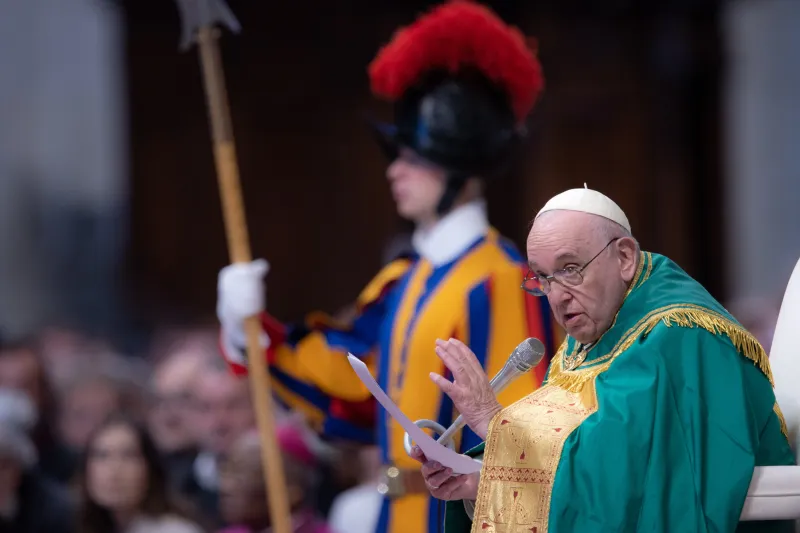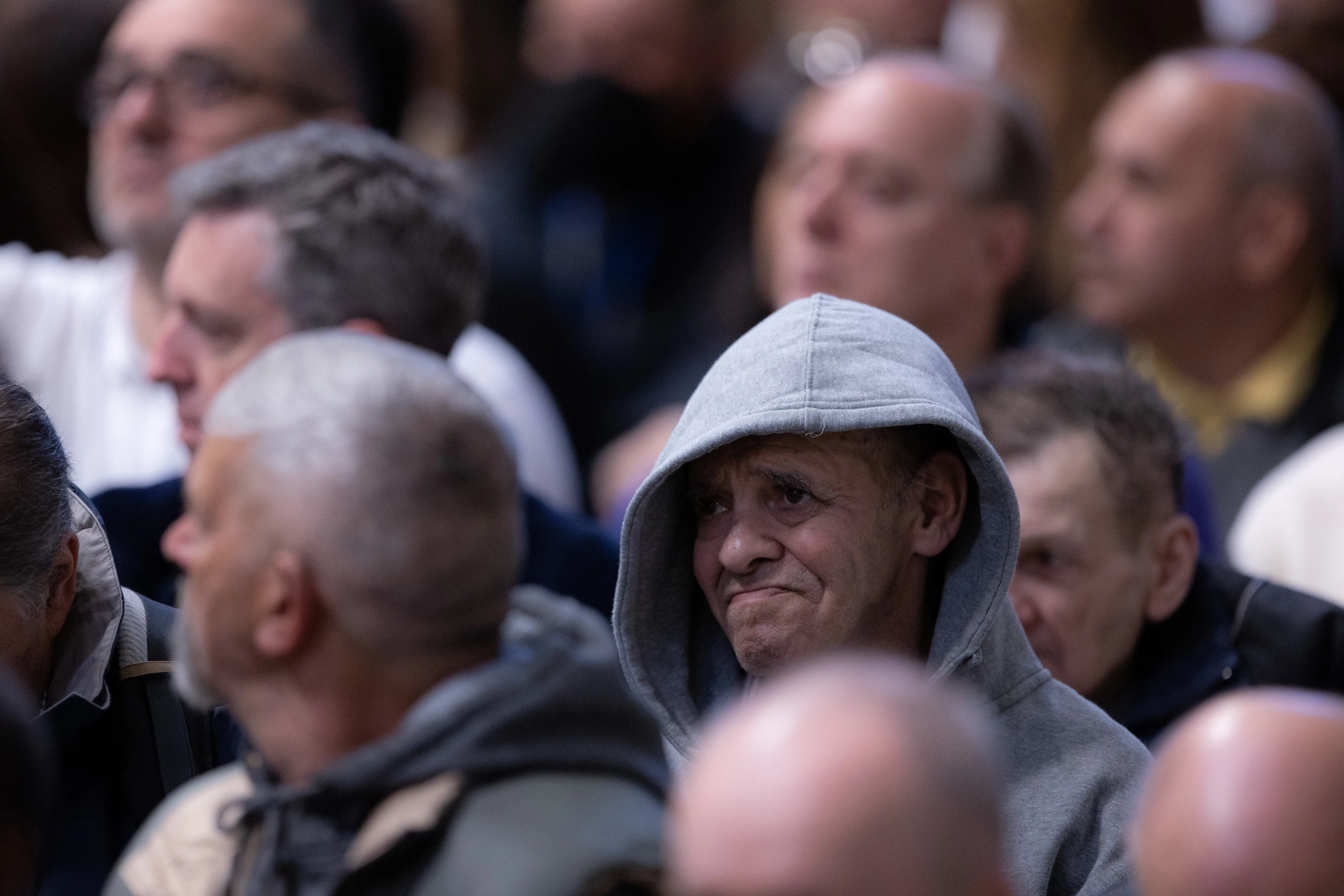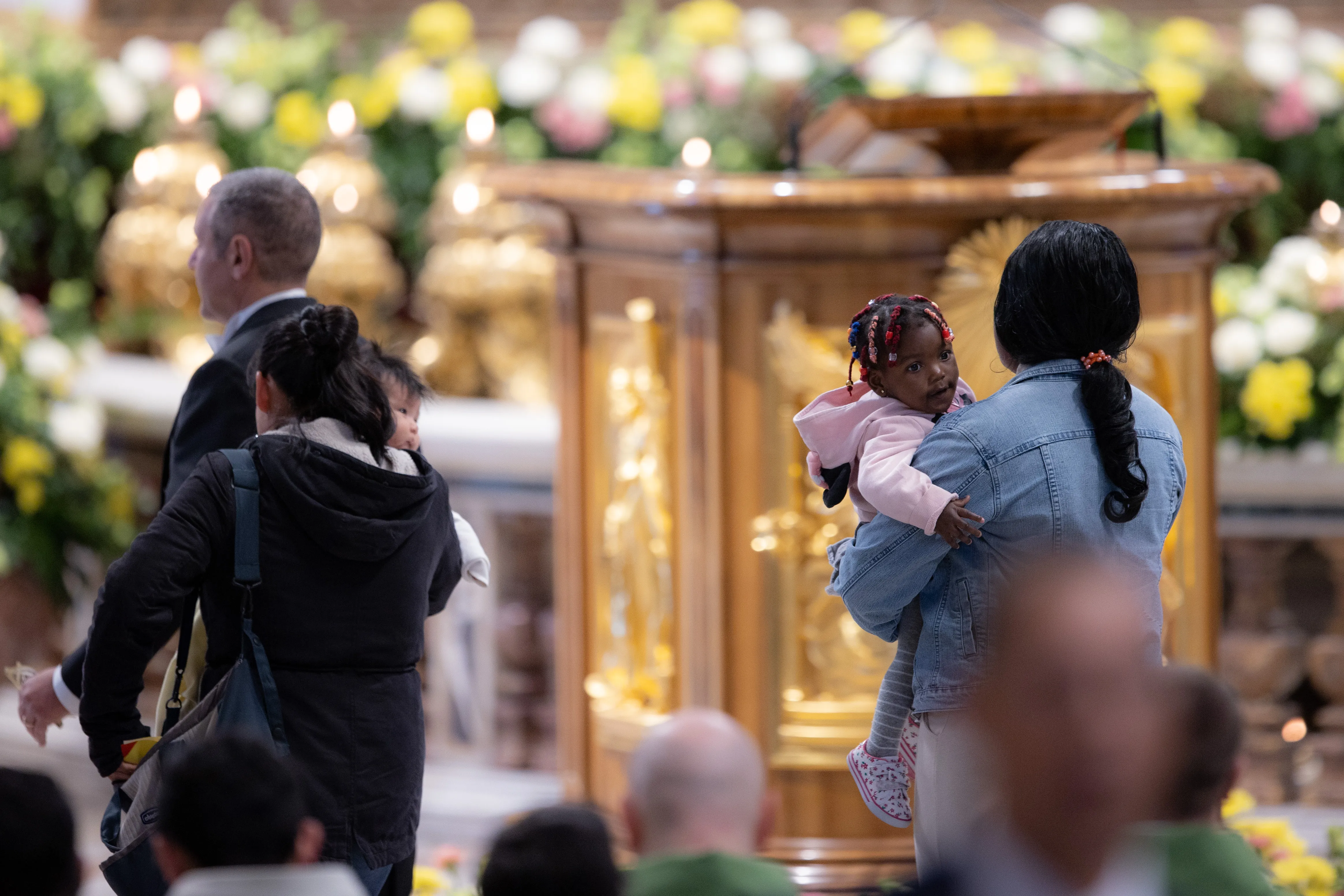 Pope Francis waves to pilgrims in St. Peter’s Square on Sept. 9, 2015 for the general audience. / Daniel Ibanez/CNA.
Pope Francis waves to pilgrims in St. Peter’s Square on Sept. 9, 2015 for the general audience. / Daniel Ibanez/CNA.
Vatican City, Jun 14, 2021 / 05:30 am (CNA).
Pope Francis said Monday that “the very concept of democracy is jeopardized” when the poor are marginalized and treated as if they are to blame for their condition.
In his World Day of the Poor message released June 14, the pope appealed for a new global approach to poverty.
“This is a challenge that governments and world institutions need to take up with a farsighted social model capable of countering the new forms of poverty that are now sweeping the world and will decisively affect coming decades,” he wrote.
“If the poor are marginalized, as if they were to blame for their condition, then the very concept of democracy is jeopardized and every social policy will prove bankrupt.”
The theme of this year’s World Day of the Poor is “The poor you will always have with you,” the words of Jesus recorded in Mark 14:7 after a woman anointed him with precious ointment.
While Judas and others were scandalized by the gesture, Jesus accepted it, the pope said, because he saw it as pointing to the anointing of his body after his crucifixion.
“Jesus was reminding them that he is the first of the poor, the poorest of the poor, because he represents all of them. It was also for the sake of the poor, the lonely, the marginalized and the victims of discrimination, that the Son of God accepted the woman’s gesture,” the pope wrote.
“With a woman’s sensitivity, she alone understood what the Lord was thinking. That nameless woman, meant perhaps to represent all those women who down the centuries would be silenced and suffer violence, thus became the first of those women who were significantly present at the supreme moments of Christ’s life: his crucifixion, death, burial and resurrection.”
The pope continued: “Women, so often discriminated against and excluded from positions of responsibility, are seen in the Gospels to play a leading role in the history of revelation.”
“Jesus’ then goes on to associate that woman with the great mission of evangelization: ‘Amen, I say to you, wherever the Gospel is proclaimed to the whole world, what she has done will be told in memory of her’ (Mark 14:9).”
The pope lamented what he said was an increasing tendency to dismiss the poor against the background of the coronavirus crisis.
“There seems to be a growing notion that the poor are not only responsible for their condition, but that they represent an intolerable burden for an economic system focused on the interests of a few privileged groups,” he commented.
“A market that ignores ethical principles, or picks and chooses from among them, creates inhumane conditions for people already in precarious situations. We are now seeing the creation of new traps of poverty and exclusion, set by unscrupulous economic and financial actors lacking in a humanitarian sense and in social responsibility.”
Looking back to 2020, the year that COVID-19 swept the world, he continued: “Last year we experienced yet another scourge that multiplied the numbers of the poor: the pandemic, which continues to affect millions of people and, even when it does not bring suffering and death, is nonetheless a portent of poverty.”
“The poor have increased disproportionately and, tragically, they will continue to do so in the coming months.”
The World Bank estimated in October that the pandemic could push as many as 115 million additional people into extreme poverty by 2021. It said that it expected global extreme poverty — defined as living on less than $1.90 a day — to rise in 2020 for the first time in more than 20 years.
The pope wrote: “Some countries are suffering extremely severe consequences from the pandemic, so that the most vulnerable of their people lack basic necessities. The long lines in front of soup kitchens are a tangible sign of this deterioration.”
“There is a clear need to find the most suitable means of combating the virus at the global level without promoting partisan interests.”
“It is especially urgent to offer concrete responses to those who are unemployed, whose numbers include many fathers, mothers, and young people.”
Pope Francis established the World Day of the Poor in his apostolic letter Misericordia et misera, issued in 2016 at the end of the Church’s Jubilee Year of Mercy.
The idea came about, he explained, during the Jubilee for Socially Excluded People.
“At the conclusion of the Jubilee of Mercy, I wanted to offer the Church a World Day of the Poor, so that throughout the world Christian communities can become an ever greater sign of Christ’s charity for the least and those most in need,” the pope wrote in his first World Day of the Poor message in 2017.
The Day is celebrated each year on the 33rd Sunday of Ordinary Time, a week before the Feast of Christ the King. This year, it will fall on Nov. 14.
Coronavirus restrictions forced the Vatican to scale down its commemoration of the World Day of the Poor in 2020. It was unable to host a “field hospital” for the poor in St. Peter’s Square as it had in previous years. But it distributed 5,000 parcels to Rome’s poor and gave 350,000 masks to schools.
Pope Francis followed his custom of marking the day by celebrating a Mass in St. Peter’s Basilica.
Presenting the papal message at a Vatican press conference on June 14, Archbishop Rino Fisichella noted that the pope highlighted the example of St. Damien of Molokai.
The Belgian priest, canonized in 2009, ministered to leprosy sufferers in Hawaii.
“Pope Francis calls to mind the witness of this saint in confirmation of so many men and women, including hundreds of priests, who in this COVID-19 drama have been willing to share totally in the suffering of millions of infected people,” the president of the Pontifical Council for the Promotion of the New Evangelization said.
In the message, signed on June 13, the memorial of St. Anthony of Padua, the pope argued that nowadays people in prosperous countries “are less willing than in the past to confront poverty.”
“The state of relative affluence to which we have become accustomed makes it more difficult to accept sacrifices and deprivation. People are ready to do anything rather than to be deprived of the fruits of easy gain,” he argued.
“As a result, they fall into forms of resentment, spasmodic nervousness and demands that lead to fear, anxiety and, in some cases, violence. This is no way to build our future; those attitudes are themselves forms of poverty which we cannot disregard.”
“We need to be open to reading the signs of the times that ask us to find new ways of being evangelizers in the contemporary world. Immediate assistance in responding to the needs of the poor must not prevent us from showing foresight in implementing new signs of Christian love and charity as a response to the new forms of poverty experienced by humanity today.”
The pope said he hoped that this year’s commemoration of the World Day of the Poor would inspire a new movement of evangelization at the service of disadvantaged people.
“We cannot wait for the poor to knock on our door; we need urgently to reach them in their homes, in hospitals and nursing homes, on the streets and in the dark corners where they sometimes hide, in shelters and reception centers,” he wrote.
Concluding his message, the pope cited the influential 20th-century Italian priest Fr. Primo Mazzolari, who he honored in 2017.
He wrote: “Let us make our own the heartfelt plea of Fr. Primo Mazzolari: ‘I beg you not to ask me if there are poor people, who they are and how many of them there are, because I fear that those questions represent a distraction or a pretext for avoiding a clear appeal to our consciences and our hearts… I have never counted the poor, because they cannot be counted: the poor are to be embraced, not counted.’”
“The poor are present in our midst. How evangelical it would be if we could say with all truth: we too are poor, because only in this way will we truly be able to recognize them, to make them part of our lives and an instrument of our salvation.”

[…]







